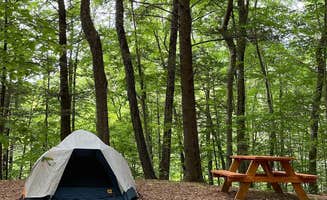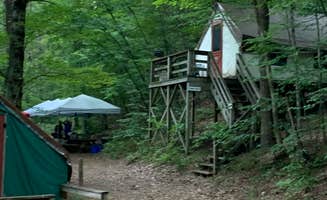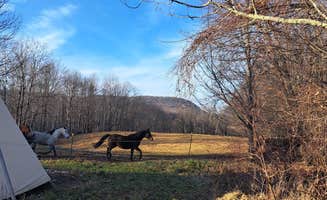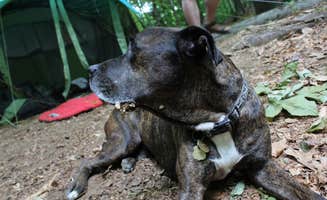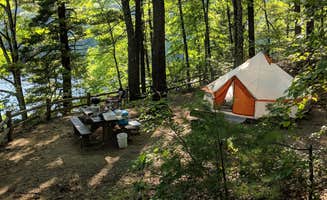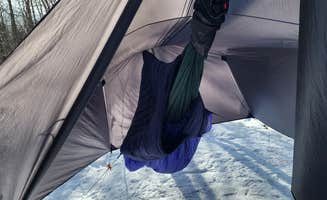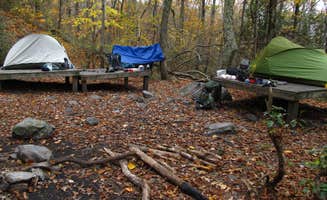Tent camping near Florida, Massachusetts offers wilderness experiences at elevations between 1,000-2,000 feet in the northern Berkshires. The region features several small lakes and ponds connected by hiking trails, with most campgrounds open May through October. Winter conditions can persist into early May at higher elevations, with frost possible until early June.
What to do
Paddle the waterways: At Tully Lake Recreation Area, visitors can rent canoes and kayaks to explore the lake. "We take our canoe and spend the whole day at the lake. You can find lots of private areas to swim, pick blueberries and relax," notes Ben P.
Hike nearby trails: The region offers varied hiking options from gentle paths to more challenging routes. "From the main entrance, collect a cart, load your gear, and following the appropriate divergent path from the parking lot or bath house (they are color coded)," advises Jean C. about Tully Lake's trail system.
Enjoy water activities: Zoar Outdoor provides organized water adventures on the Deerfield River. "The campground is connected to an adventure/outing company that provides white water rafting, tubing and other water activities on a nearby river," reports Seth K.
Explore local waterfalls: Several cascades are accessible near camping areas. "If you'd like to hike with children, there is an easy hike close to the entrance, along Doane's Falls, a series of 5 waterfalls along an ascending path through a wooded area," describes Nancy R.
What campers like
Privacy between sites: Campers appreciate the spacing between tent sites. "We stayed at site 1, which was HUGE and extremely private. Sites closer to the water that we saw were less private, but still very peaceful and spread out," writes Megan G. about her Tully Lake experience.
Vehicle-free camping: Barton Cove Campground offers a quiet experience with sites separated from parking areas. "No cars at all at the campsites, which was great for peace of mind as our toddler roamed around. It also made for a super quiet stay," one visitor noted about the car-free camping environment.
Waterfront access: Many campsites offer direct water access. "You can paddle on it and explore its shoreline," Miguel B. mentions about Tully Lake. "The camp's minimal store sells ice cream and a (very) few sundries, so come prepared."
Clean facilities: Campground maintenance receives positive feedback. "Amenities are well maintained. Could use a refresh but overall great experience will be back," reports Dominick V. about his stay at Zoar Outdoor.
What you should know
Cart-in camping: Most sites require carrying or carting equipment from parking areas. "This is a 'Carry In' campground. You park at the entrance, register with Ranger. Large wooden wheelbarrows are provided to bring your gear to your camp site," explains Nancy R.
Limited connectivity: Cell service is minimal in most camping areas. "Cell coverage is pretty close to absent or poor in most of the area, so download any maps you might want (driving, trail, geocaching) before you arrive," advises Jean C.
Reservation requirements: Popular sites fill quickly, especially waterfront locations. "The sites fill up weeks out (and can completely fill the day registration opens, which is date-dependent each year...Booking for Memorial Day meant I booked in April), so you have to be on your game," warns Kris M.
Weather preparedness: Seth Warner Shelter and other higher-elevation sites experience variable conditions. "The long trail is a very wet nasty trail but it can be dry so be careful having a fire. Hang your food! Watch for bears and coons," advises Daniel S.
Tips for camping with families
Choose sites near facilities: When camping with children, consider proximity to bathrooms. "Our site was fairly far from services, long run with small kids in the middle of the night. Not our favorite place, but to be fair mostly based on our site and neighboring campers," shares Lauren A. about her Tully Lake experience.
Plan for carrying gear: Families should pack efficiently. "The sites near the water or on bluffs are further away, and though they provide carts the trails can make hauling them tough. Keeping gear to a minimum is a good idea," suggests Miguel B.
Consider paddling options: Some waterfront sites allow water access for gear transport. "If you have a waterfront site you may choose to paddle your gear over," notes Jean C., which can be an adventure for families.
Bring recreation equipment: Chester Railway Station provides unique camping experiences for train enthusiasts. "It is a really fun place to spend a night, especially for a train enthusiast. The caboose is stationed on a big grassy field, near a real railroad," explains Esther L.
Tips from RVers
Limited RV access: Most campgrounds in the region cater primarily to tent campers, with few RV-friendly sites. "This was my very first camping trip and I loved it! I even like that it's rustic and you can't drive your vehicle to the site," notes Stacey W. about Tully Lake, highlighting the tent-focused nature of local campgrounds.
Consider alternative accommodation: Maple Ridge Farm offers transportation assistance for gear. "They'll drive you in an ATV up to some of the sites that are further away from the parking lot," mentions Les R., which may help those accustomed to RV camping adjust to tent camping in this region.
Prepare for minimal hookups: RVers should note that electrical and water hookups are generally unavailable at most sites in the Florida, Massachusetts area, requiring self-sufficient camping preparations.


